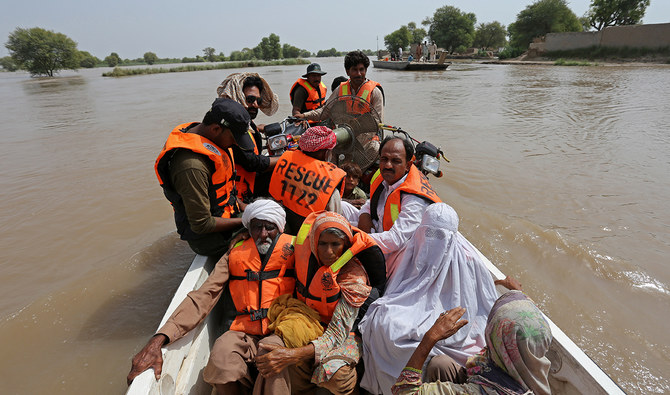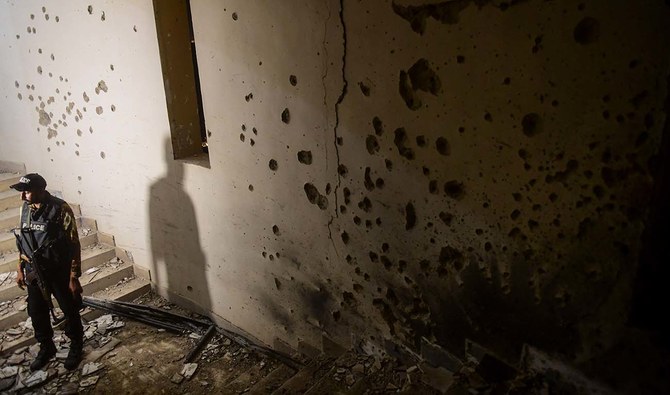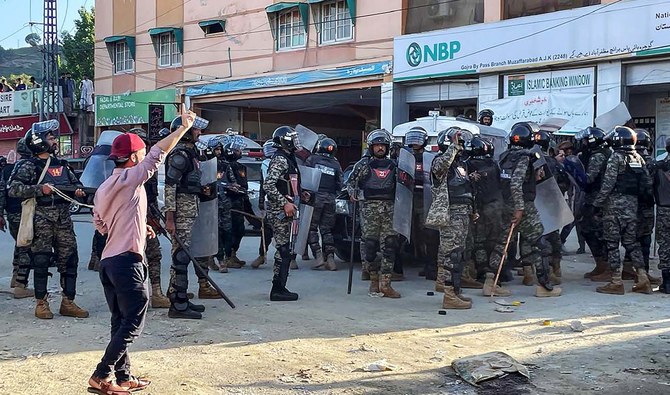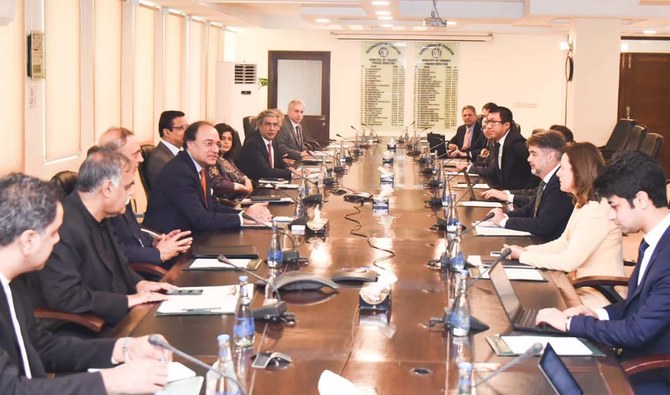ISLAMABAD: At least three people were killed and scores injured as protesters clashed with paramilitary Rangers troops in Azad Kashmir, officials said on Monday, despite Pakistan’s announcement of a $83 million subsidy to reduce wheat flour and electricity prices in the region.
The development comes amid days-long protests in the disputed Himalayan valley, which is administered by Pakistan, led by the Jammu Kashmir Joint Awami Action Committee (JAAC), which is demanding subsidized wheat flour and that electricity prices be set as per the hydropower generation cost in Azad Kashmir.
On Saturday, a policeman was killed in clashes between police and demonstrators as authorities blocked a rally from moving toward Azad Kashmir’s capital, Muzaffarabad, from the region’s Poonch and Kotli districts. Weekend talks between the JAAC core committee and AJK Chief Secretary Dawood Bareach in Rawalakot ended in a stalemate and a planned march by protesters to the capital resumed on Monday.
Azad Jammu and Kashmir (AJK) Prime Minister Anwar-ul-Haq said at a press conference on Monday the regional government had notified reduced prices of wheat flour and electricity after Pakistani Premier Shehbaz Sharif okayed Rs23 billion ($83 million) in subsidies.
“Despite the issuance of notifications to reduce electricity and wheat prices, along with addressing other demands, protesters attacked a Rangers convoy, leading to an exchange of gunfire that resulted in the death of three civilians and many injuries on both sides,” Abdul Majid Khan, a spokesperson of the AJK government, told Arab News.
“The deployment of Rangers is not uncommon and their [protesters] attack on the convoy was uncalled for as it occurred after the government had already accepted their demands,” he added.
“The situation is currently under control and we are trying to bring calm as the government will not allow mischievous elements to succeed.”
Amjad Ali Khan, a member of the JAAC core committee member, said the protesters had been contemplating calling off the protest after the price reduction announcements, but the situation had “completely changed” after the killings of the three demonstrators.
“At the moment, we are not clear about the exact number of injured as many are injured, while three deaths have been confirmed,” he told Arab News.
Amjad said protesters got agitated by the heavy deployment of the paramilitary Rangers and clashes resultantly erupted in different areas of Muzaffarabad.
“Although the actual issue for which demonstrations started [protesting] has been settled, this new development has changed everything and now we will decide our new course of action tomorrow (Tuesday),” he added.
The Himalayan territory of Kashmir has been divided between India and Pakistan since their independence from Britain in 1947, with both countries ruling part of the territory, but claiming it in full. The western portion of the larger Kashmir region is administered by Pakistan as a nominally self-governing entity while India rules the southern portion of the larger Kashmir region as a union territory.
While the Indian portion has faced an ongoing insurgency for decades and multiple armed attempts by the state to quell it, the Pakistani side has remained relatively calm through the decades, though it is also highly militarized.
SUBSIDY
Earlier on Monday, AJK PM Haq announced a reduction in the prices of wheat flour and electricity in the region, thanking Pakistan PM Shehbaz Sharif for approved a Rs23 billion ($83 million) subsidy to make it possible.
“He [Sharif] issued instructions and the things that had been pending for a long time with regard to subsidy, electricity prices, resources, have been provided to Azad Kashmir,” Haq said.
The new price of electricity in the region will be Rs3 per unit for 1-100 units, Rs5 per unit for 100-300 units and Rs6 per unit for those consuming above 300 units. Commercial unit price will be Rs10 for 1-300 units, and Rs15 for above 300 units, according to Haq. A 40kg bag of wheat flour, which was previously priced at Rs3,100, will now be sold for Rs2,000.
“This would cost more than Rs23 billion to the national exchequer,” Haq added, “which the [federal] government and the prime minister of Pakistan gladly accepted.”
















